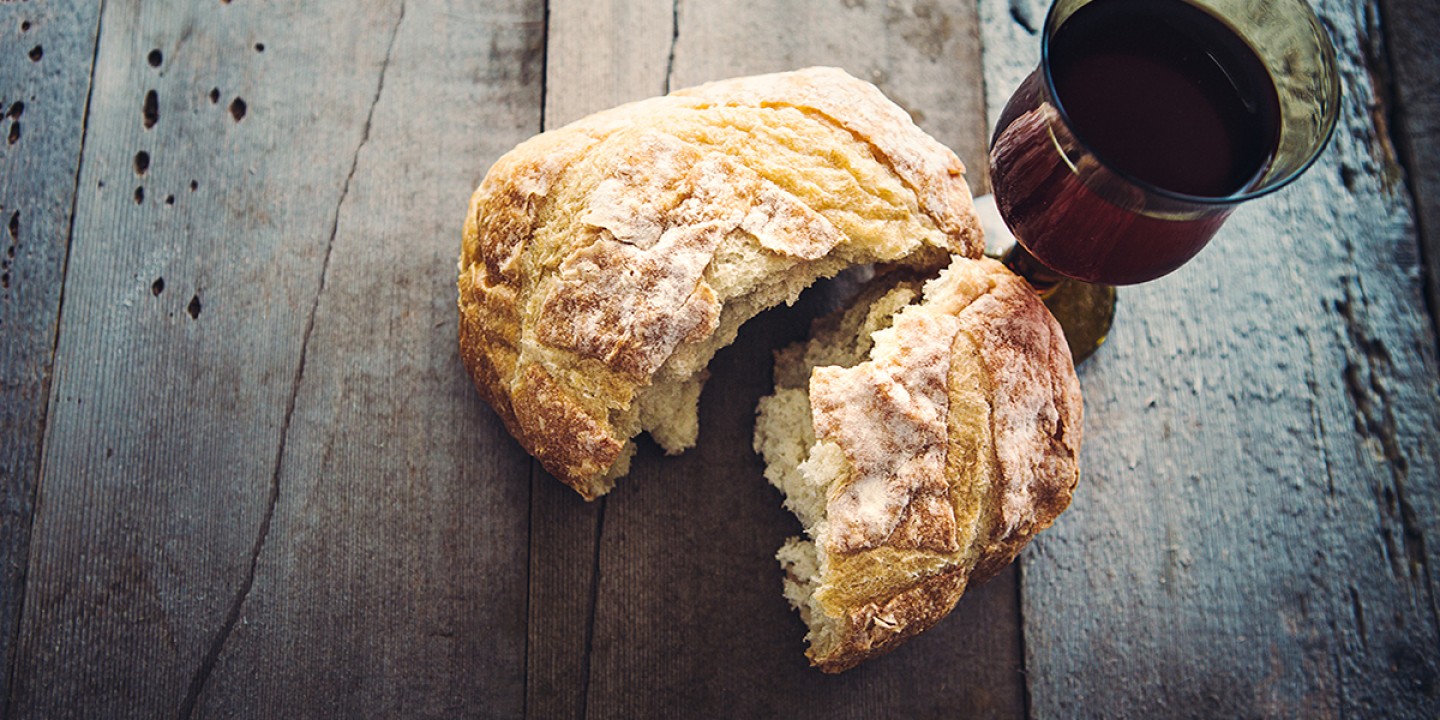Communion tears
In my 15 years as a pastor, I’ve seen a lot of watery eyes at the table.

I park my car on the service road along the highway between Chapel Hill and Durham, in front of a storage facility and a mechanic shop. I walk to the end of the road and then down a dirt path that cuts through bushes and shrubs, winding around the skeletons of refrigerators and washing machines devoured by vines, until I reach a passageway slashed through the curtain of kudzu. In the middle of the open space, people have set up folding chairs around a folding table, and on the table a banquet—vegetable stew and cornbread, pastries and cakes, coffee and sweet tea.
We sit and eat and talk, feasting on the food and companionship. Soon we quiet our conversation as Carolyn walks to the flimsy table and shifts the spread around in order to clear a spot for the bread and cup. We turn our chairs and attention to her. “My soul is satisfied as with a feast,” she calls to us, “and my mouth praises you, O God, with joyful lips.” The words from Psalm 63 draw us into worship.
Read our latest issue or browse back issues.
We sing a few hymns, and Carolyn preaches on the assigned Bible passage, a short sermon on God’s prodigal love. Then I stand behind the table, reciting the words from 1 Corinthians 11: “On the night when he was betrayed, Jesus took bread.” Steam from the loaf wafts around our circle as I break it in my hands. I step from one person to the next, tearing off pieces, placing them in hands, pausing for a glimpse into each person’s eyes.
One person stands behind the others, off to the side of our circle. He has been a friend for many years; I know he has survived more than anyone should bear in a life. His head is bowed, his hands cupped in front of him. His tangled hair clumps down to his shoulders. I smell the dried sweat and stale alcohol as I walk over. “The body of Christ, broken for you.” I rest a chunk of bread in his palm. He gulps down a sob before he chews. His shoulders shake; his chest trembles. Tears stream down his cheeks, washing through his matted beard.
After the service he asks to borrow my phone. “Hey, I had to call you to tell you something,” I overhear him say. “I’m with church people, in the woods by the Walmart, and you’d never believe what just happened.” He speaks quickly, loudly; I can hear him over the noise from the highway traffic just beyond the tree line. “They let me eat the communion.” When he returns the phone to me, I notice that his eyes are still swimming in tears.
Evagrius, in his fourth-century meditation De oratione, invites his community to “pray for the gift of tears.” Tears are divine gifts because they flow from God’s grace; they are signs of communion in the Holy Spirit, who is the wellspring of our joy. Teresa of Ávila, in her 16th-century spiritual memoir, testifies to the presence of God’s spirit through tears: “I have seen the flow of tears from great consolations,” tears born from contentos, as she writes in Spanish—the contentment, the solace, the peace of the Holy Comforter.
The joy of God’s spirit is the theme of the psalm that Carolyn read during the communion service: God as the one who satisfies souls with feasts, who fills mouths with praise, whose touch shivers lips with joy (Ps. 63:5). Lips ecstatic with praise, eyes alive with joyful tears. Communion astonishes the senses with the taste of grace.
Tears of joy flow, wrote the 15th-century English mystic Margery Kempe, “because heaven is so merry.” To break and share the bread is our participation in the exuberance of heaven, the wonders of God’s mercy.
I remember other tears at communion. Once, during Sunday worship, I stood at the Lord’s Table—bread in hand, my church before me, a line of people stretching through the center aisle. One by one I looked down as each person presented their empty hands, already bearing the marks of so much life. When I broke a piece from the loaf and placed it in the center of one church member’s palm, I felt a drip on my hand. I glanced up to see tears trickle down her cheeks, pouring from her trembling chin into her hands and dampening the bread.
Communion tears remind me of a line from Augustine of Hippo, from one of his sermons where he tells his church that they are like the eucharistic loaf. When we see the bread we see ourselves, in our union with Christ: “after a certain amount of pounding and crushing, we are joined together by means of water.” For Augustine, the water in the bread-making process is baptism. After all the watery eyes I’ve seen at the communion table over the past 15 years of my pastorate, I wonder if the water is also the tears that come with the pounding of our lives, of being human in this crushing world. When we cry, the apostle Paul writes, the Holy Spirit bears witness with our spirits, God’s breath in our wordless sighs (Rom. 8:15–16, 26).
Jesus also wept. Christ knows our tears. The bread testifies to the one who suffered this world’s crucifixion and now offers us a sign of grace, an assurance of mercy we can hold in our hands, a promise we can taste.
A version of this article appears in the print edition under the title “Communion tears.”






